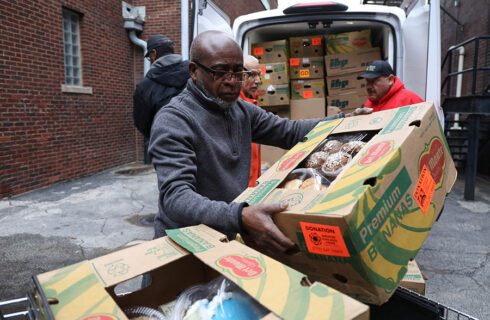David Weinert has physical ailments that limit the work he can do each month. Some months, he can work 150 hours, while others he can only manage 30.
“I have a decent rent payment, but sometimes it is still a struggle,” Weinert said. “If I have to start affording food on top of that, I would be homeless. Those are your options, you have got to eat, maybe you don’t have to be in a house, but you have got to eat.”
Weinert and two other people who receive food assistance through the Supplemental Nutrition Assistance Program (SNAP) met recently with Sen. Dick Durbin to share their stories in the context of a proposed rule from the Trump administration. This proposed rule would limit the ability of states to protect people considered to be “able-bodied adults without dependents” from onerous work reporting requirements.
Under the proposed rule, SNAP recipients could lose their benefits unless they meet certain work requirements.
“There is this notion by some that anyone who is asking for help to pay for food is just lazy. And if they worked a little harder they would be able to take care of themselves,” said Durbin, a longtime champion of the Food Depository’s mission to end hunger. “We are facing that debate all over again.”
“Unfortunately, these rules were written without considering the real life challenges that people face. We are here today to hear from people who are receiving SNAP to understand what they face,” he said.
Currently, the state of Illinois is able to waive the work requirement for most of the state, excepting DuPage County, because of high unemployment and insufficient jobs. This rule could go into effect as soon as October, if it is not challenged.
“Part of the reason we are meeting with you today is because the people who are on SNAP don’t always look like you expect them to and I think we are an example of that,” Karen Hilberg, a former teacher, said to Durbin at the meeting.
Hilberg has been unable to work since 2012 when she suffered a brain injury at her teaching job. It took four years for her to receive disability benefits, she said, and during that time, she was considered to be an able-bodied adult despite her injury.
“The takeaway is that maybe I have to fight for workers comp benefits, maybe I have to fight for housing, maybe I have to fight for healthcare, but we are just saying that food shouldn’t be something we have to fight for,” Hilberg said.
Hilberg’s story is just one example of how this proposed rule to SNAP threatens vulnerable people.
Take Action
The U.S. Department of Agriculture, which oversees SNAP, is collecting public comments on the proposed change. The deadline is April 2.
To learn more about the proposed rule change, read the Food Depository’s recent op-ed in the Chicago Tribune.
Raise your voice and stand up for SNAP by submitting your own comments.
Share This Post



